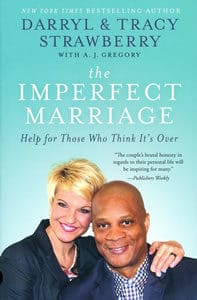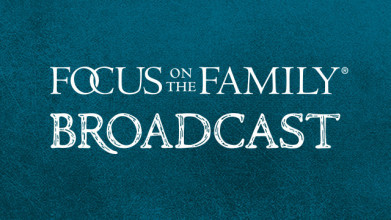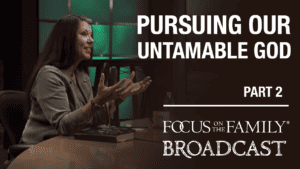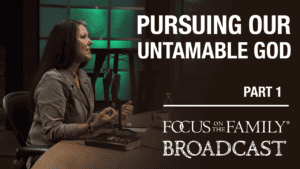John Fuller: He was a power-hitting, eight-time, all-star outfielder with four World Series rings, and his jersey, number 18, is about to be retired by the New York Mets. But his career and his life were once derailed by substance abuse, prison time and dysfunction all around. Today on Focus on the Family with Jim Daly, you’ll hear the lasting hope that Darryl Strawberry and his wife Tracy have found in Christ. Your host is Focus president, Jim Daly, and I’m John Fuller.
Jim Daly: John, there’s one thing that connects us all as human beings. Unfortunately, it’s our sinful nature. The Bible says, “None is righteous, no not one.” The good news is, we have a savior, Jesus Christ. And when we believe in Him and repent of our sin, we find forgiveness for those sins. Uh, we’re gonna hear from Darryl and Tracy Strawberry who have, uh, come from a place of deep struggle and who have found the answer in Christ. And although they’re retiring that jersey, it strikes me, the man who first put that on is not the man who’s going to that ceremony now.
John: No.
Jim: He’s changed.
John: That’s quite an observation, Jim. Uh, as I mentioned, Darryl played for a number of, uh, Major League baseball teams during 17 seasons, including the Mets and the Yankees, and, uh, as you said, the Mets are gonna honor him and retire his jersey on June 1st in New York City. And, uh, we’re gonna hear now, uh, the conversation with Darryl and his wife Tracy recorded a few years ago. Uh, it’s an incredible story. Let’s go ahead and hear that now on today’s Focus on the Family with Jim Daly.
Jim: Let me welcome both of you to Focus on the Family.
Darryl Strawberry: Well, thank you. Thanks for having us. It’s great to be here with you guys.
Tracy Strawberry: Yes.
Jim: Uh, Darryl, I mean, what achievement, um, with baseball. I mean, we talked a little bit off mic about it, but, um, what does it feel like to get to that mountain? I mean, most people, sports figures in our culture are lifted up and vaulted in such ways. I mean, what did it feel like to go everywhere and everybody pulling on you and asking for an autograph? It has to be a little daunting?
Darryl: Well, it is, uh, it is. It’s a, it’s a great feeling, uh, to be able to achieve something that you strive for as a, as a kid. Uh, when you watch baseball on television and you go, “I wanna do that one day,” and then you realize that you have the talent to go out and, and be able to play at, at the level from starting from high school and you get better, and then you go onto professional ball and you get in there, um, and you realize that, you know, this can’t happen. And, and when I talk about that, it, it really did happen, but I think I was driven because of my pain. I think a lotta times you, you see athletes and you see athletes be successful, but what’s really going on down inside of them, most people never know.
Jim: Well, let’s start there. Let’s talk about your childhood being a boy growing up in LA. I grew up in LA. Uh, Tracy, we’re… think about it, ’cause we’re coming to you next. Both of you have powerful stories about growing up. Uh, Darryl talk about your background. What was happening in your life as a young boy?
Darryl: As a young boy, my life was very dysfunction. My dad was a raging alcoholic and, um, you know, coming to know that his father was a raging alcoholic, so he ended up seeing his father, uh, being abusive, so he ended up turning being very abusive-
Jim: Huh.
Darryl: … to us as kids, you know, and our family and our mom. And, you know, he’d just come home night after night drunk and, um, just in a rage of everything.
Jim: Ah.
Darryl: And, you know, he would beat us and, you know, a lot… I grew up with a lotta pain, um, dealing with that. And I think most people don’t realize r- realize that, they only see the fact that I put on the uniform and I became great as a baseball player. But, uh, before I ever put the uniform on, I was already scarred inside because my father said I’d never amount to nothing, I’d never be nothing. And, you know, he came home one night, pulled out a shotgun and said he was gonna kill all of us and, um, we went into action at the age of 13 and we almost, we almost killed him, and, uh, it woulda been a tragedy, um, in my life had not my mom allowed us to get out the house and get away from the situation. So it was already… We were already embedded with some things that most people didn’t ever see because they were behind closed doors, and that’s what happens behind closed doors of people homes, you don’t see, uh, the abusive stuff that goes on and the negative stuff that goes on. All you see is when one come out and, and he becomes someone famous and important, then people go, “Well, what’s wrong with him?” You… The scars are already deep inside and, um, if those scars had never healed, those scars would carry into your adulthood and, and you, you’re just gonna act them out in life, and that’s what happened to me.
Jim: N- Y- Your mom had, uh, faith in Christ, is that right?
Darryl: Yes.
Jim: And how did that play into your understanding of the world? I mean, did that make a difference for you? Did, did you see something in your mom that of course you didn’t see in your dad?
Darryl: Oh, of course. I mean, made a big difference in, in how I viewed things about life because I knew she was someone who, uh, was a Christ follower, and not just only a Christ follower, but she lived it.
Jim: Ah.
Darryl: I saw her help other people, I saw her do things that, uh, most people wouldn’t ever imagine. You know, here she is, she had a son that, uh, was being successful and, and was blessed and, and I poured into my mom life and blessed her with everything, and she would bless other people-
Jim: Ah.
Darryl: … that were hurting. So, uh, that was a sign there that she was different, you know, than anything else I’ve ever seen, ’cause the opposite of what my father was.
Jim: And did they break up that night when you were 13 and you had that struggle? Was that the end of your family, or did your mom and your dad stay together longer?
Darryl: No, that was the end.
Jim: That was the end.
Darryl: My mom, my mom realized there that he had to go because now my children have been put into a situation of danger.
Jim: Ah.
Darryl: And it was a t- it was a, it was a totally different mindset for me and my brothers th- after that night, because we came very close to killing my father. There was no question, um, about it in, in our minds that he was no longer gonna come in this house and he was no longer gonna come in here and…
Jim: Ah. Darryl, when you look at that experience as a young man, um, y- and you think of all the broken homes today. Um, you and I both, uh, came from tough neighborhoods in Los Angeles. Does your heart break for those kids that are going through similar and sometimes even more severe things than you went through and I went through?
Darryl: No question. Um, my h- my heart breaks tremendously and my wife heart breaks tremendously. And, um, we’ve always decided to empower young people because of some of the struggles that we had to overcome. And we know the importance of young people who are in homes and who are in broken situation and the struggles and the pain, we know that, we know it’s real.
Jim: Yeah.
Darryl: And, and my wife has been so gracious to, um, have so many young people in our homes and, uh, and taking care of them and trying to raise them and having them live with us, uh, because we know it’s real, we know that, um, if someone don’t capture them and lead them down the right road, um, we know that the enemy’s gonna, uh, deceive them and take them to a place where they could never imagine.
Jim: Yeah.
Darryl: Um, and, and some may n- never make it back, you know-
Jim: Yeah.
Darryl: … and, and that’s what we need to understand about, um, who we are in Christ. You know, our, our job is to really help people know that their life matters to God and God cares, and empower young people with that and don’t shove it down their throat and love them right where they at. Um, you show them the love of God and, and they’ll know the way back, and they will always return back to that way regardless of how difficult it gets.
Jim: And again, these are things that you learned over a period of time, and we’re gonna get into more of that detail in a minute, but, uh, Tracy, I wanna get you into the conversation here, obviously. Um, talk about your upbringing and what happened, um, as a teenager, and what were you dealing with? You were coming from a Christian home, right?
Tracy: Yes, I have… my parents were beautiful people. I didn’t come from dysfunction at all, um, which is just proof there that the enemy has a plan for your life and God has a plan for your life, and we have a choice.
Jim: Huh.
Tracy: Um, and my parents loved me, I had opportunity, we were a, a middle class family. I went to Christian school, uh, we went on vacations, we did all of those things.
Jim: You have three sisters?
Tracy: Yes, I have three sisters.
Jim: And where are you in the birth order?
Tracy: I’m the second one.
Jim: Okay.
Tracy: I’m one of the middle children. (laughs)
Jim: Okay. Yeah, right. (laughs)
Tracy: As they say.
Jim: The negotiator. (laughs)
Tracy: Yes, the negotiator, that’s me. (laughs)
Jim: And what happened? I mean, uh, it sounds like you had a good environment.
Tracy: Mm-hmm.
Jim: It’s so interesting if you look at the contrast of what Darryl just talked about-
Darryl: Mm-hmm.
Tracy: Yes.
Jim: … and, you know, the rage and the anger that you have as a-
Tracy: Mm-hmm.
Jim: … young boy growing up with that kind of shame and that kind of pain-
Tracy: Sure.
Jim: … when your dad is beating your mom, beating you.
Tracy: Mm-hmm.
Jim: Um, but you had a different environment, yet-
Tracy: I did.
Jim: … the enemy was still able to get ahold of your soul.
Tracy: Yes.
Jim: Describe that.
Tracy: Yes.
Jim: H- Why was it dark for you?
Tracy: I never got ahold of Jesus. I just never embraced Him for myself. Um, and we can only go so far living on our parents’ faith before we make a decision where we embrace it for ourself and we begin to have an experience with Jesus Christ ourself. Um, and my attention was drawn to the world, “Who am I? Why am I here?”-
Jim: Mm.
Tracy: … very early on, um, just losing myself. I wanted the excited, I wanted the world. And I know that now. When I was younger, I didn’t understand what was going on with me. And my parents tried to love me every which way they could. They tried the tough love, they tried, um, “Let me walk through this with you,” kind of love. Um, gravitating to boys at a very young age, I loved the attention, just started to try to find my identity and just gave… a rebellious spirit gave birth to me very young.
Jim: There, uh, there was something that occurred, and you mentioned it in the book.
Tracy: Mm-hmm.
Jim: It’s a delicate subject.
Tracy: Yes.
Jim: But you had physical abuse when you were a girl, right?
Tracy: Yes, I was molested when I was young by a neighbor, not by my parents, not inside-
Jim: Right.
Tracy: … of my family, um, nothing of that nature. And that was something that I had just put away in the back of my mind-
Jim: Huh.
Tracy: … for, for a lot of years, and just didn’t address that or deal with that, and never thought, until I was older, to take a look at that to see, well, maybe that contributed to, um, some of the choices I made. It definitely changed my thinking.
Jim: Right.
Tracy: It changed my thinking at eight years old, it changed my thinking dramatically. And I remember that clearly. I remember just being a completely different person from a mindset perspective.
Jim: Sure.
Tracy: Um, and trying to figure that out and live life through that. And the way I did that when I was younger is I just shut it off.
Jim: Right.
Tracy: I just shut it off, I didn’t deal with it.
Jim: Well, y- yeah, emotionally, you shut down.
Tracy: Emotionally.
Jim: And you start to control it. And, and I could s- you know, see that. That’s a pattern that happens-
Tracy: Right.
Jim: … uh, with young people, both boys and girls.
Tracy: Right.
Jim: So move us forward in your story that led to a lotta brokenness, right?
Tracy: Mm-hmm.
Jim: You married and then that was difficult.
Tracy: Yes.
Jim: Just fill in those blanks for us.
Tracy: Yes. Just when you run… I ran in the world and I embraced the world, so I embraced the thinking, I embraced, um, the strategies of the world, I embraced the selfishness, me, myself and I.
Jim: Huh.
Tracy: I’m in this world now to make it on my own. What is my purpose? And my life was defined by my own opinion. I’m gonna be successful, so I’m gonna have a great career, a great job. I’m gonna meet this great man, he’s gonna look good and we’re gonna live a great life, we’re gonna have excitement, we’re gonna go on vacation, we’re gonna be successful, we’re gonna have some kids. And I am going to make my life work according to this pattern that I’ve developed in my own mind and in my own way. That’s what I sought after.
Jim: So what was that formula gonna do for you? I mean, it sounds like a formula.
Tracy: That formula was gonna bring me success.
Jim: And that was gonna make you happy.
Tracy: That was gonna make me happy. That was gonna settle my soul, that was gonna make me happy, um, find the man of my dreams, the fairytale concept, if you will. And I had my own thought of how you men should be and exactly how you should treat me. (laughs)
Jim: I think you’re speaking for most women right now, actually. (laughs)
Tracy: Right. (laughs) Which we found out later in the story as that plays out, that’s not reality. That’s denial. That’s a lie.
Jim: Huh.
Tracy: And it’s very unrealistic. And God played no part in my life. Um, he just played no part in my life, and the Bible certainly was not the direction manual.
Jim: Wh- when you look back because, be a lot of parents are listening right now,-
Tracy: Yes.
Jim: … and they have that 19-year-old Tracy-
Tracy: Mm-hmm.
Jim: … or that 23-year-old-Tracy-
Tracy: Yes.
Jim: … or that 13-year-old Tracy-
Tracy: Mm-hmm.
Jim: … they’re struggling. They don’t know what to do. They’ve tried tough love, they’ve tried gentle love. And it just seems like this daughter or this son of mine does not want to hear-
Tracy: Mm-hmm.
Jim: … the wisdom that comes from me as a parent or from God. What would you say to them? What could have made that different? Could anything have made that different in your relationship with your parents?
Tracy: Sure. It’s… When I look back, my parents did the best they could. So sometimes we can’t change the past, that’s what I always say first. So let’s not stay there too long because that can be a very dark place. If there was something that you could’ve changed and it comes to your mind quickly and you know you could’ve changed that, then you need to bring that to the Father and deal with yourself in that area. But looking at a child, people cannot change people, and we can love them, we can lead them and we can give them direction, but they’re gonna come to a place where they embrace their own way. And it’s free will.
Jim: Mm-hmm.
Tracy: There’s free will there. And it’s not a, this is not a comfort answer, a padded answer in a way of there was something that you could do to change that individual. My parents tried everything. There was nothing they could do to change me.
Jim: Yeah.
Tracy: I had made up my mind, this is what I was gonna do. One thing my parents did do, even through the dysfunction of it all, they loved me through it all, but they had very strong boundaries.
Jim: Mm-hmm.
Tracy: They did not enable me, they did not allow me to live in their home at a certain age. “If this is what you’re gonna choose, you’re gonna have to do that somewhere else.”
Jim: Ah.
Tracy: “We love you and we’re always here, but we can’t change you, we can’t make you, but we also cannot tolerate this in our home.”
Jim: Wow. I… That, that is well said. I mean, those are the right things to do.
Tracy: Mm-hmm.
Jim: So I would think that love made all the difference, maybe not in the moment,-
Tracy: Right.
Jim: … but certainly later in your life when you could realize it.
Tracy: That love brought me back and allowed me to have an open mind to Jesus Christ.
Jim: Yeah. Mm.
Tracy: It brought me back.
Jim: You’re, you’re listening to Focus on the Family. Our guests today are Darryl and Tracy Strawberry. Uh, they’re book, The Imperfect Marriage: Help for Those Who Think it’s Over. And we’re gonna get to that aspect of the story in just a minute.
John: And call us if you’re one of those parents that Jim just described, if you’re scratching your head saying, “We’re trying to do everything right,” um, here at Focus we have parents in that very same situation on staff.
Tracy: Mm-hmm.
John: But we have a great counseling team, and, um, we can help you get some first steps toward, uh, containing and managing that situation and releasing it, perhaps, to God as you need to. Uh, our number here is 800-A-FAMILY, 800 the letter A and the word FAMILY.
Jim: Uh, Darryl, let me come back to you. Um, I could be wrong, but it seems like you may be a little uneasy talking about your 20s and your baseball career. Um, you were a great player and you could hit a ball like few other guys could hit it.
Darryl: Well, I’m not really uncomfortable with it, it just doesn’t exist, um, anymore in my life. My career was a, a, a career that I played and had a lotta fun and done a lotta great things, um, but I don’t really look back on it, um, and say, “I wish I coulda,” I think, ’cause a lotta times I, I look back on it before when I was in the midst of all the struggle and all the issues I was going through, um, and was thinking, “I was I coulda done this different.” Um, but after really giving my life over to Christ, I, I realized that I’ve done something different, so that’s probably what you mean where it’s uncomfortable because, you know, most people, and I think, uh, athletes and movie stars and people that are, are public figures, um, they could never get past what they used to do.
Jim: Right.
Darryl: And that’s why they can’t never enter on the other side.
Jim: Right.
Darryl: And, and that’s what, um, 2 Corinthians 5:17 talks about, “Old things have passed away, behold all things that become new.” Though, if you don’t let the old pass away, you can’t walk into the new.
Jim: But wait, that’s interesting putting it that way, ’cause what I, what I’m thinking about is the Apostle Paul. I never thought about that, but think of what he brought into the big leagues. He was that Christian crusher, he was the guy that went out and was killing the Christians. And, you know, news didn’t travel fast in those days, so I’m sure when he, uh, came to the scene, it was all about his past-
Darryl: Right.
Jim: … and not who he was today.
Tracy: Mm-hmm.
Jim: But let me ask you about that in terms of the moment, what you were dealing with as a human being. You have all this fame, you’re going out every night, playing for the Yankees, that’s where, you know, that’s where everybody wants to play. And what was going on personally for you with the drugs? And what was going on?
Darryl: Well, f- fame is only what you make it, and I think a lotta times we look at fame as being the most important thing. Uh, what was going on inside with me was who am I? You know, regardless of how many home runs I hit, how many championships I win, how many, you know, millions of dollars I make, um, or how successful I, I am, but the real question inside of me always wanted to know, “Who am I? Why was I created? What’s the purpose of my life?”
Jim: Hm.
Darryl: There’s a great purpose, see, a baseball career is just a career, baseball… I could tell you what’s gonna happen in baseball, somebody gonna win, somebody gonna lose.
Jim: (laughs) That’s pretty much it.
John: (laughs)
Darryl: And, and, and somebody’s gonna be more successful than another player, and somebody’s gonna have deep-rooted issues, others are not. Um, some are hidden. That lifestyle, uh, of fame, um, brings a lotta secrets in a person’s life, and my life was no different, um, from the secrets of, of trying to fill the emptiness that was inside. I had all the money, I had beautiful homes, two million dollar homes sitting on the golf course, but I had nothing because all I was doing was accumulating a lotta stuff. Inside I had nothing, I was empty inside, I was bankrupt inside, you know, and I needed to fulfill what was going on inside of me, so I used, I used drug, I was a liar, I was a cheater, I was a womanizer, I was an alcoholic and I was a drug addict, and I was a sinner.
Jim: Hm.
Darryl: Saved by grace, because God’s grace is sufficient. But that’s who I was until I came to the place of knowing, you know, who God was, see God’s grace is sufficient for all of us. G- That’s the thing about Jesus, Jesus don’t care about, you know, what you are, He cares about redeeming you and liberating you and bringing you to the, uh, place and purpose of why you have been created so you can walk in the fullness of what He’s called you for. See, all that what I was when I was a baseball player was all true because the separation from knowing who God was didn’t allow me to actually enjoy the fact that I was a good baseball player.
Jim: Huh.
Darryl: You know, I, I did it outta frustration or out of dealing with what the media said about me and what people said about me and said I couldn’t do this and couldn’t do that because they were just like what my father had said.
John: Mm-hmm.
Darryl: And I heard the voice-
Jim: Yeah.
Darryl: … of one of ’em saying like my father said I wouldn’t amount to nothing so I, my thing was, “I’ll show you.” And that’s what most of us do, we say, “We’ll show you,” but we’ll stuff this pain down inside of ourself and we’ll keep that and deal with that, um, in our actions the way it acts out. ‘Cause it, the pain of a person’s life will play out in this life, eventually it will play out in this life or it will kill him.
Jim: When you look at, and it’s beautifully said, um, and what comes to my mind is nobody is beyond the reach of God.
Tracy: Mm-hmm.
Jim: How did God get ahold of you? I mean, where was that first inkling where your mom may have come to your mind, her faith-
Darryl: Well-
Jim: … wh- where did God get ahold of you and say, “I’m right in front of you, come with Me”?
Darryl: Well, of course it was my mom, watching her, watching her life and the way she lived her life for Christ, but it was 1991 when I came to Christ, but I didn’t get discipled, there was no discipleship.
Jim: Right.
Darryl: ‘Cause I… if you don’t go through the discipleship after coming to Christ, you will go back to the familiar.
John: Wh- and what was that familiar for you?
Darryl: Oh, the same lifestyle, the women, the drugs, alcohol. Uh, I went right back to it, just that quick. I remem- I remember clearly, I got hurt and I ran into the wall, made a play and dislocated my shoulder, and it was my first season in LA, and I, I was saved and I, I dislocated my shoulder and I kinda like, “Oh, well, it’s no big deal, I, I’m out.” All the sudden, you know, it was like I was started to get leery about everybody was commenting about, “Well, he wasn’t playing well and it’s the beginning of the season,” and stuff, so, you know, I didn’t stay on board with, you know, going forward with God and being discipled like I should have, I, and I got lost back into, you know, my, my old ways, because I wanted to prove them wrong once again myself.
Jim: Right.
Darryl: Second half of the season, I played great. And it was a sign ’cause I was back, so there it was, I didn’t really need God, ’cause I was back at what I was doing, what everybody wanted me to do, play baseball well. And I didn’t take a stand for Christ.
Jim: Ah.
Darryl: And I took a stand for, you know, what everybody opinions was instead of taking the stand for who Christ was in my life and, and I had to go through this process of, of learning. And I, I’m grateful for God, I’m grateful for His grace, grateful for His mercy, ’cause I don’t deserve it, but He gives it to me daily.
Jim: Oh, yes.
Darryl: And, and I’m grateful that I do know, you know, through that whole process of my fall back then would bring me to a greater place in my life today that I would be able to see who Jesus is and would be able to go out and, and minister to people and help people come to know who Jesus is.
Jim: Okay, so the Lord has gotten ahold of you, but you’re not quite walking with him yet. Tracy, I wanna turn back to you quickly as we end today, but I’m gonna ask you guys to keep going, and we’re gonna come back next time and fill in the story.
Tracy: Okay.
Jim: But where were you kind of about this time, uh, you had gone through one marriage-
Tracy: Yes.
Jim: … and then a second marriage.
Tracy: Yes, quickly.
Jim: And what was God doing, uh, to get your heart? And you were trying to work your formula of success,-
Tracy: I was.
Jim: … which so many people are.
Tracy: Yes.
Jim: So I appreciate that honesty-
Tracy: Sure.
Jim: … and that transparency. But w- where was God working in that spot of your heart to say, “Tracy, I’m here”?
Tracy: Yes, at that time, um, I couldn’t see God working on my heart, so I refused to even acknowledge Him because I was in so much pain, um-
Jim: Did you get bitter?
Tracy: I got bitter, I was broken. Um, I yelled at Christians like you if I heard another person come up to me and say, “Jesus loves you.”
Jim: Ah.
Tracy: Um, when you say love to a person, we need to use discernment, when you say, “Jesus loves you,” in the… to a person who is suffering severe pain, it doesn’t add up.
Jim: Ah.
Tracy: They do not add up because the two don’t go together.
Jim: Right.
Tracy: So if you serve this loving, almighty, powerful, great, amazing God, and if I ask Him to come upon me right now, He’ll deliver me from drugs, He’ll take away this pain, and by the way, where was He when I was eight years old when this was going on? Where was He? And these are the questions that people of the world have. And, um-
Jim: That’s a good warning.
Tracy: … we have to be ready to answer those questions, and that’s exactly where I was when God was working on my heart, that a beautiful woman would come into my life and she wouldn’t even address any of those things, she just simply would invite me and love me and just simply allowed me to be okay. She said, “God can handle your pain.” She wouldn’t even go there with me.
Jim: Mm.
Tracy: She just loved me, invited me to Bible study. She fed me. And that’s the quick introduction of how God really showed up in my life and I finally started to get a glimpse of possible saying yes to Him.
Jim: And it, i- to paint a picture for what you were struggling with at that time, very much like Darryl, drugs had taken ahold of you as well, right?
Tracy: Yes, absolutely. I just ran so far, and how does a woman like me who comes out of a beautiful home? So I think we need to come to a place where, um, horrible things happen to people, I wanna focus on the choice, whether it was a great upbringing or it wasn’t, regardless of where you are today or where you are not today, where you believe you can be or where you think you can’t be, you have a choice. And Jesus lays before us a choice, and he gives us the choice, choose life or death, to come to Him, to come into a new life, a redeemed life, a healed life, a whole life, a new life, Eternal life is presented. And He is a good and an awesome, amazing God that will lead you into a new way of living, and it takes a fight, but we all have that choice. You have the choice to be well, you have the choice to be redeemed, that choice is right before you, right now, today. You make that choice, now you can begin again. If you never make that choice, you can never begin again.
Jim: You’ll be struck in that trap.
Tracy: You’ll be stuck forever.
Jim: Tracy, I couldn’t… I mean, that was beautiful the way that you said that, and again, we’re right at the end of today’s program, but I want to come back next time and talk more about how God did exactly that-
Tracy: Mm-hmm.
Jim: … for you and for you-
Tracy: Sure.
Jim: … Darryl, and how you came together and what you have learned in marriage and in life-
Tracy: Mm-hmm.
Jim: … from that point forward. Can you stay with us?
Tracy: Yes.
Darryl: Yes.
John: What a great visit, uh, that we had with Darryl and Tracy Strawberry on Focus on the Family, and you’ll hear more of their story next time as they share about their relationship and God’s work in their lives. And their book, once again, is called The Imperfect Marriage.
Jim: John, I so appreciate this great testimony that we’re hearing. If you’ve been discouraged in a difficult marriage, uh, maybe you’re feeling without hope, we can assure you that there is hope, as we’ve seen with the Strawberries’ marriage as they’ve overcome great odds through God’s work in their lives. It takes humility, and I think that’s one of the things you’re hearing here. I wanna encourage you to contact us and learn more about Hope Restored. It’s a marriage intensive program that takes place over several days. At Hope Restored, a team of highly qualified, committed marriage counselors, uh, provide couples the biblical tools to begin the healing process. And we have a post two-year 80% success rate. It is an incredibly program, so please call us to find out more. And also, ask for a copy of The Imperfect Marriage.
John: We’re a phone call away. Our number is 800 the letter A and the word FAMILY, 800-232-6459. Or stop by focusonthefamily.com/broadcast for more information about Hope Restored and that great book by the Strawberries. And we’d ask, if you’re able, to send a monthly gift to Focus on the Family and help us extend the ministry to others. We do rely on your generosity, and of course your prayers as well, so see thousands of marriages strengthened every year through this broadcast. So when you donate today a gift of any amount, we’ll send a copy of Darryl and Tracy’s book as our thank you gift. On behalf of Jim Daly and the entire team, thanks for listening to Focus on the Family. I’m John Fuller inviting you back next time as we once again help you and your family thrive in Christ.




















